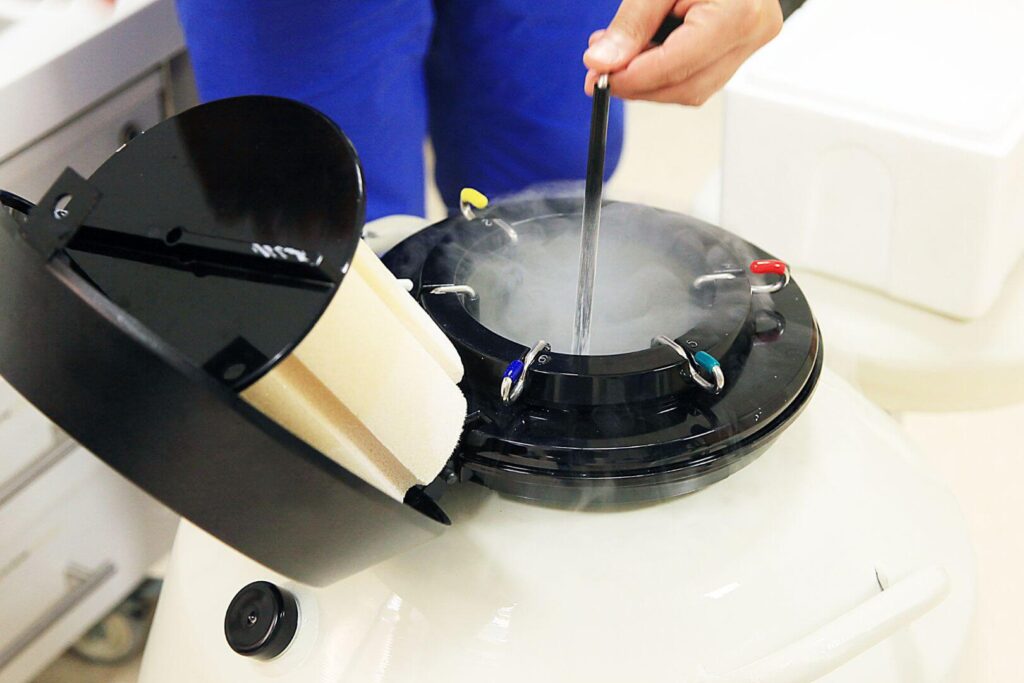Gender transitioning is a deeply personal decision to make and it often involves a multitude of considerations. Among these considerations, fertility is a significant one that deserves careful attention.
According to the National Library of Medicine (NIH), research shows that about 51% of transwomen and 54% of transmen would have considered fertility preservation before any gender-affirming treatment if they were more informed.
With such high numbers, it is evident that more information and awareness on the topic of gender transitioning and fertility would be beneficial.
Whether you’re considering hormone therapy, surgery, or other steps in your transition journey, understanding how your transition may affect your fertility is important.
Here are five things you should know about your fertility before transitioning genders.
Table of Contents
1. Hormone Therapy Can Impact Fertility

For gender-affirming purposes, hormone replacement therapy (HRT) is the use of hormones such as testosterone and estrogen to masculinize or feminize an individual’s appearance to be more aligned with their gender identity. Starting HRT is a common method used to assist many individuals in their transition journey.
While a great resource, the question remains, does HRT cause infertility? The answer is yes, it can. Starting HRT can affect fertility in various ways and can cause infertility with long-term use. However, it is important to note that infertility is not absolute or universal with the use of HRT. The effects of hormone therapy on fertility differ from person to person.
HRT Effects Timeline

For transgender men (assigned female at birth), testosterone therapy typically stops both menstruation and ovulation, leading to infertility over time. Without a cycle, the eggs cannot be released from the ovaries, and therefore natural conception cannot occur.
For transgender women (assigned male at birth), estrogen therapy may lead to a decrease in sperm production because of the lower levels of testosterone in the body.
The effects of HRT are different for everyone, so it is important to consult with a physician to understand how your fertility could be affected over time.
2. Fertility Preservation Options Exist

As studies have shown that more than half of trans individuals would have considered fertility preservation options if they were more informed, it is important to know your fertility options as you transition.
If you’ve envisioned having biological children in the future, it’s recommended to look into fertility-preserving options before starting hormone replacement therapy or undergoing gender-affirming surgery.
Egg and sperm freezing

With growing access to fertility care in more recent times, we aim to educate on topics like fertility preservation techniques. Fertility preservation is the process of freezing and storing eggs, sperm, or reproductive tissue so that it can used to have biological children in the future.
The cryopreservation of eggs and sperm before any gender-affirming action can provide transgender individuals with the opportunity to preserve their genetic material for later use in assisted reproductive technologies (ART) like in vitro fertilization (IVF).
3. Timing is Critical

Fertility preservation procedures are most effective when performed before starting hormone therapy or undergoing surgeries that may impact reproductive organs. The earlier you explore fertility preservation options in your transition journey, the more likely you are to have viable options for future family-building.
However, it’s never too late to discuss fertility preservation with a reproductive specialist, even if you’ve already begun hormone therapy or undergone some aspects of gender-affirming surgery.
4. Not All Gender-Affirming Surgeries Affect Fertility Equally

Gender-affirming surgeries are surgical procedures done to alter a transgender or non-binary person’s appearance or functional abilities to align with their gender identity and feel more comfortable in their bodies.
While some gender-affirming surgery results in permanent infertility, this does not mean all gender-affirming surgeries affect fertility equally.
Surgical procedures such as a hysterectomy, the removal of the uterus, or an orchiectomy, the removal of the testes, result in permanent infertility due to the removal of reproductive organs and their functions. This would be referred to as “bottom surgery.”
However, other procedures like chest masculinization for transmen or breast augmentation for transwomen do not directly impact reproductive function because they are not procedures related to the reproductive organs. These are referred to as “top surgery.
Types of Gender-Affirming Surgeries
Below are a few surgical procedures that are often considered to help align one’s gender identity.
Gender-affirming surgeries that can cause infertility
- MTF Bottom Surgery: reshaping the genitals to align with female anatomy
- FTM Bottom Surgery: reshaping the genitals to align with male anatomy
- Hysterectomy: the removal of the uterus
- Orchiectomy: the removal of the testes
Gender-affirming surgeries that do not affect fertility
- MTF Top Surgery: adding implants or sometimes fat tissue to create breasts
- FTM Top Surgery: the removal of breast tissue
- Facial Feminization Surgery (FFS): a set of surgical procedures to alter facial features to create a more feminine appearance
- Facial Masculinization Surgery (FMS): a set of surgical procedures to alter facial features to create a more masculine appearance
These surgeries can be deeply personal but also transformative experiences for transgender or non-binary individuals to affirm their identity and alleviate gender dysorphia.
Before proceeding with any surgical alterations, it’s essential to consult with a physician regarding the long-term effects and potential impacts on fertility. Exploring alternatives or options for preserving fertility, if desired, would be a beneficial part of these conversations.
5. Emotional Considerations Are Important

Fertility-related decisions can bring out complex emotions in anyone. The possibility of infertility or the need for fertility preservation procedures may bring up feelings of loss, grief, or uncertainty about future family-building possibilities. These emotions can be deeply connected with the journey of self-discovery and embracing one’s gender identity.
Taking steps in your transition journey is a powerful affirmation of your authenticity and right to live comfortably in your own skin. Addressing gender dysphoria and aligning your physical appearance with your gender identity can be liberating. However, the possibility of fertility-related changes can introduce additional complexities to the transitioning process.

With the emotional challenges that may arise, it’s important to prioritize your well-being and seek support from mental health professionals, support groups, or trusted loved ones. Everyone deserves to feel comfortable and affirmed in their identity.
Remember that fertility is just one aspect of your overall health and well-being, and there are different options for building a family that could be explored. By seeking support from healthcare professionals and engaging in open, honest conversations about your needs and priorities, you can make more informed decisions while navigating fertility and gender transitioning.
Learn more at RFCFamily.com/LGBTQIA.





